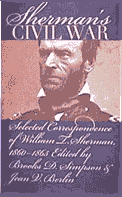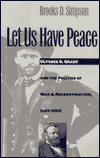Professor Brooks Simpson
 | Professor Brooks Simpson U.S. Grant and Reconstruction Mary 24, 1999 |

Brooks D. Simpson is Professor of history and humanities at Arizona State University. He is an expert on Ulysses S. Grant, the American Civil War and Reconstruction. Of the latter, he provides a powerful analysis of a darkly formative period in American history in two of his most recent works: "Ulysses S. Grant and the Politics of War & Reconstruction" and "Reconstruction Presidents." He has also written "Think Anew, Act Anew: Abraham Lincoln on Slavery, Freedom, and Union." He has also written a book yet to be published on General William Tecumseh Sherman.
Books by Professor Simpson
 |
 |
 |
Transcript
| US | Hello, it is 10:00 in the morning, May 24, 1999, in Tempe, Arizona. It is 92° and beautiful. I am sitting with Professor Brooks Simpson, an expert on the Civil War and the Reconstruction period. We'll start with a question from one of you. Please ask away! |
| Ques | What is your opinion of the Civil Rights Act of 1867? |
| Simpson | The Civil Rights Act passed in 1866 was the first effort by the federal govt. to define citizenship and to offer protection to those people in cases where states failed to do so. Had the southern states offered equal protection under law for African-Americans, the legislation would not have been necessary. The act provided the foundation for subsequent civil rights legislation and the definition for national citizenship, but proved less effective in forcing southern civil courts to dispense color-blind justice. |
| sebs | Reconstruction seemed to become a political nightmare as it progressed. Would things have been different if Lincoln had been in charge in the beginning? |
| tinky | Had President Lincoln not been assassinated, what do you think his policy of Reconstruction would have looked like? |
| Simpson | At the time of his death, Lincoln was reassessing his approach to Reconstruction. All of his previous pronouncements had been shaped by wartime necessity, especially his desire to weaken support in the south for the Confederacy. He wanted to offer dissatisfied southerners an alternative to remaining under Confederate control, He had yet to address the problems associated with emancipation and equal rights for blacks. Unlike Andrew Johnson, Lincoln would not have tolerated the wave of anti-black violence that swept through the south in the fall of 1865 |
| BBNancy | Did the north offer equal protection under law for African-Americans? |
| Simpson | On the whole, Republicans fought for and Democrats opposed equality. The issue of race was a vibrant one in northern politics. Democrats frequently charged that Republicans sought to introduce black equality across the board. They would not have made this charge if they did not feel that a substantial number of Northern voters would be alarmed by that possibility. Black suffrage in particular presented Republicans with a difficult challenge in the north as well as in the south. One of the reasons Republicans came to support the Ratification of the 15th amendment was so they could bypass state legislators, where Democrats often prevailed. |
| thaddeus | After the Civil war was over, how common was it for a freed black family to stay on the farm they worked on before the Civil War? |
| Simpson | Not all that common. But it was not unusual either. Many blacks sought new beginnings in other locations. Some merely wanted to test their freedom to move about Observing this, through the lens of white supremacy, southern whites claimed that this movement demonstrated that blacks would not work unless coerced. Many blacks left their old plantations in order to reunite families separated by slavery and war. |
| Ques | He wrote the last pages of his book on his deathbed. |
| Simpson | Grant finished his memoirs within a week of his death. By that time he had observed that many former confederates had joined their former foes in celebrating Grant's accomplishments. And praising him as a symbol of national reunion. |
| Dave | Why was replacing Fremont with Halleck important to Grant? |
| Simpson | When Halleck replaced Fremont as commander in the department of Missouri, Grant found out that hereafter he would operate under much closer supervision. While Fremont was a soldier/politician, Halleck was a professional soldier who distrusted Grant's abilities and was jealous of his subordinates' successes. |
| mustangs1 | Grant had been a heavy smoker for years. He had an addiction to both liquor and to tobacco. Is this what caused his death? |
| Simpson | Grant was certainly addicted to tobacco use. Before the war he was partial to pipe smoking. But during the Battle of Fort Donelson, instead of using a sword, he directed troop movements with the wave of a cigar. Hearing of this, supporters sent him thousands of boxes of cigars. And, ever pragmatic, Grant started smoking them. That, in turn, led to the throat cancer which ultimately killed him. Grant's drinking habits have long been a subject of controversy. Whether he was indeed an alcoholic is problematic. That he did drink and that as a result he sometimes was intoxicated, there is no doubt. His reputation as a drunkard was used by enemies seeking to discredit him. |
| mustangs1 | Did they interfere with his duties (as general and as President)? |
| Simpson | The short answer is no. However, his reputation for drinking to excess was a useful tool in the hands of his political opponents and military rivals. |
| mustangs1 | What did Grant's troops think of Grant? Did they know of his drinking? |
| Simpson | Grant's men respected their general. And trusted him to do what was right. They were aware of his efforts to feed and clothe them and to make sure they were looked after. They were not disturbed by he rumors surrounding Grant's drinking. |
| tinky | What kind of cigars did Grant smoke? What percentage of men smoked cigars in Grant's time? What bourbon did he drink? |
| Simpson | I don't know what brand of bourbon he drank. I don't even know if he drank bourbon. The story goes that Lincoln once inquired what brand of whiskey Grant drank, so he could send a barrel of it to each of his other generals. |
| Dave | How did Grant finally come to settle on New Carthage as a major base site for the Union army? |
| Simpson | Both New Carthage and Cairo, Illinois, offered Grant excellent bases from which to penetrate the Confederate interior. Grant understood the importance of waterways in penetrating Confederate defenses in the Mississippi valley. |
| thaddeus | Would you consider Andrew Johnson a racist judged by the standards of his day? |
| Simpson | Even by the standards of his day, observers noted that Johnson's attitudes on race were extreme. |
| sebs | What were Grant's primary successes in Reconstruction and his major failures? |
| Simpson | We have to remember that to Americans living during Reconstruction, national unification was as important as securing justice and equality for black people. It proved impossible to reconcile those two goals. In that sense, Grant's failure was also the failure of all Americans. No one then or now has proposed an alternative that would have fostered national reconciliation and protected black rights. |
| mustangs | What was Grant's position on slavery? |
| Simpson | Before the war, Grant was opposed to slavery (in the abstract), but did not know how to get rid of it. He believed that Abolitionists were trouble-makers. He married the daughter of a slaveholder and for a time he owned a slave, whom he freed in 1859. Although Grant went to war believing that the Union's prime objective was to destroy the Confederacy he came to accept that the only way to achieve a complete and lasting victory was by destroying slavery. Of the major Union commanders, he was the most enthusiastic advocate of enlisting blacks in the Union army. When Robert E. Lee insisted on treating black Union soldiers who were former slaves differently that other Union POWs, Grant responded by saying in essence that it was the color of the uniform and not the soldier's skin that was of primary importance to him. |
| elizabeth | How was Grant's army captured at Fort Donelson? |
| Simpson | Grant's army was not captured at Fort Donelson. Rather, he captured a Confederate army of about 15,000 soldiers. It was the largest capture of enemy force at that time in American history. |
| mustangs1 | For Reconstruction, what would have happened if President Johnson had been removed from office? The VP and his positions? |
| Simpson | If Johnson had been removed, Senator Benjamin Wade of Ohio would have become President. Wade endorsed Republican policies toward Reconstruction. But even his fellow Republicans saw him as controversial. This may have played a role in the decision of several Republican senators to vote 'not guilty.' |
| mustangs | If you could have been one person around Grant, who would you have been and why? |
| Simpson | Horace Porter, because he advised Grant both during the war as a staff officer and during the early years of Grant's presidency. He had an excellent chance to observe Grant both publicly and privately. |
| elizabeth | Grant successfully tried to open the Mississippi River (for the purpose of capturing the fortified river ports of Vicksburg and Port Hudson). Is this what later gave Grant the recognition to become President? |
| Simpson | Vicksburg and Port Hudson were critical and important. They did not make him a Presidential candidate. Grant himself came to accept running for President reluctantly and only after he was convinced that to leave politics to professional politicians would risk endangering the fruits of the military victory that he had played such a role in securing. |
| Dave | Why did Grant order troops to attack Confederates at Vicksburg on May 19th even though he knew the probability of success was very slim? |
| Simpson | Actually, Grant believed that he had a good chance of taking Vicksburg by assault on May 19 and May 22. He thought he had the Confederate defenders demoralized and on the run. He also wanted to avoid the prospect of a long siege in an area where the climate was conducive to the spread of disease. |
| mustangs1 | How's the weather there in Arizona? Here in Cherry Hill, New Jersey we've got severe thunderstorms. |
| Simpson | The weather here is bright, clear, warm. Thank you for asking. |
| mustangs | Why was Grant the right choice for general of the Union? |
| Simpson | Grant was able to see the war as a whole. To coordinate the operations of different field armies. To maintain good relations with his civil superiors. And that in order to defeat the Confederacy, one had to strike not only at confederate armies, but also at their sources of supply. And to target the morale of the civilians. |
| tinky | How influential were carpetbaggers? What exactly did they do? |
| Simpson | The carpetbaggers are a mixed lot. Some came south for laudable and principled reasons and were sincerely concerned with the welfare of blacks. Others saw an opportunity to make a buck. In certain states, they proved critical to Republican prospects. Several served as governors and as senators. |
| thaddeus | I read that over 600 African Americans held elective office during Reconstruction. How would you generally rate their legislative performance? How effective were pioneers like Blanche Bruce and P.B.S. Pinchback and Hiram Revels? |
| Simpson | On the whole, blacks were no better nor worse than their white counterparts. They looked out for the interest of their constituents. And were often the targets of terrorism. Among the more prominent black politicians are P.B.S. Pinchback of Louisiana and John R. Lynch of Mississippi. |
| mustangs1 | Terrorism from the KKK? |
| Simpson | Terrorism of the KKK, which was one of several white supremacist, terrorist organizations who battled to destroy Southern republicans and the dream of black equality. |
| mustangs1 | Even after Lincoln was elected, could clearer heads prevailed and Civil War have been avoided or confined? |
| Simpson | As Lincoln himself realized, any political compromise in the winter of 1861 that allowed for the expansion of slavery merely postponed an inevitable conflict. On the other hand, a majority of whites in the deep south realized that if they did not secure slavery's future, the "peculiar institution" would some day be destroyed. |
| mustangs1 | So you think it was inevitable? |
| Simpson | A conflict was clearly inevitable over the issue of slavery. Whether that conflict needed to be war is another question entirely. But the finest politicians in the land had struggled long and hard to reach a settlement without success. |
| mustangs | What was Grant's childhood like? |
| elizabeth | What was Grant's education like? |
| Simpson | Grant grew up in Ohio, gained a reputation as a skilled horseman, and a fairly bright but bashful student. In 1839, his father sent him to West Point. Of 75 students who entered with him, only 39 graduated 4 years later. Grant's final class rank of 21 was due in part to his carelessness about military protocol and dress. |
| mustangs | Any other famous names in his class? |
| Simpson | Grant knew famous people at West Point, including William T. Sherman, and Longstreet, his own class was not particularly distinguished. For him personally, the most important classmate was Frederick Dent. Dent happened to be the brother of his future wife Julia. |
| mustangs | Did Robert E. Lee graduate around the same time as Grant? |
| Simpson | Robert E. Lee graduated in 1829, Grant in 1843. |
| thaddeus | Did Reconstruction take up the entire political agenda of Johnson's and Grant's administrations? What other national business was getting done? |
| Simpson | Reconstruction was the dominant issue during the Johnson administration. For Johnson actually took office as the war was coming to an end. However, many northerners grew increasingly impatient with the failure to reach a lasting resolution of the issue connected with Reconstruction. And many of the people who voted for Grant did so in the belief that he would bring Reconstruction to an end. During his presidency, Grant had to juggle Reconstruction with other issues, including international relations, territorial expansion and an economic depression of 1873. |
| Dave | Besides his general abilities, were there any other reasons for Grant's election? |
| Simpson | Grant was elected in 1868. Because many voters feared that the election of his Democratic opponent, Horatio Seymour, would prolong and intensify the debate over Reconstruction, During the Civil War, as governor of New York, Seymour had addressed draft rioters as "my friends." Although black votes provided Grant with a popular majority, even without black votes, he would have prevailed in the Electoral College. |
| elizabeth | Grant's army was captured in 1862 was it then when Grant attained the strength to win various battles thereafter? |
| Simpson | Grant's army was never captured. However, Grant captured 3 confederate armies, at Fort Donelson, Appomattox, and Vicksburg |
| mustangs | What made Grant such a hero? |
| Simpson | Americans saw in Grant someone very much like themselves, an unassuming, almost bashful man who loved his wife and enjoyed his children. It was his low-key, almost laid-back appearance which made him so approachable and so likable. To Americans, he seemed like one of them. Grant's father was an ambitious business man, who started in the tanning trade. His mother was quiet, reserved, and religious. They embraced anti-slavery beliefs and looked to prosper in a free-labor environment. For the remainder of his life, Grant would always struggle to meet his father's expectations as a businessman. At the same time, towards his own children, Grant proved to be a loving, supportive, even indulgent parent, in marked contrast to the way his father treated him. |
| US | Last question for the day ... |
| tinky | Most historians seem to judge Grant's Presidency a failure. Do you agree? |
| Simpson | Historians who judge Grant a failure have themselves failed to define what would have constituted success during his Presidency. That Grant was reelected in 1872 and that many Republicans considered him for a third term in 1880 suggest that many of his contemporaries did not consider him a failure. However, the problems facing Grant when he became President were so daunting and so difficult that it is hard to see how even the most expert professional politician could have devised a more successful set of responses. |
| US | Thank you very much everyone for joining us. Thank you Professor Simpson. |
| One textbook | Up to $300 |
| US textbooks, annually | $10 billion |
| ushistory.org | free |
Meet the Historians
These renowned historians and experts chatted with students online. Read the transcripts.




















